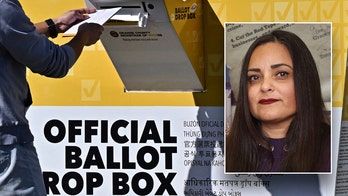New Balance says White House reneged on sneaker promise
CEO speaks out on 'Fox & Friends' about failed deal that would have provided American-made shoes to the military
Footwear giant New Balance reportedly was promised a shot at landing a huge military contract in exchange for dropping its public opposition to an Obama-touted trade deal -- but now the Boston-based company is lashing out, claiming the Pentagon has reneged on the deal.
“We swallowed the poison pill that is TPP so we could have a chance to bid on these contracts,” Matt LeBretton, a New Balance VP, told the Boston Globe.
New Balance CEO Robert DeMartini, speaking on Fox News, also confirmed Thursday that the company had told the administration they’d “remain silent” on the trade deal if they could compete for the shoe contract. But lately, he said, “things just got quiet.”
“We simply can’t get through,” said DeMartini, describing how several recent meetings with a top Defense official have been abruptly canceled.
According to the original report in The Boston Globe, the company now is prepared to speak out against the Trans-Pacific Partnership -- the 12-nation trade agreement that President Obama is eager to pass through Congress, but which companies like New Balance fear will spur cheap imports.
The report threw back the curtain on the apparent backchannel talks to help lower the volume of public opposition to the TPP deal. New Balance’s central charge is that, despite assurances in exchange for support on the trade pact, the Pentagon is now stalling on any proposed shoe contracts.
“The chances of the Department of Defense buying shoes that are made in the USA are slim to none with Obama is president,” LeBretton told the newspaper.
According to the report, the company wants to land a contract to provide athletic shoes to military recruits. Under a decades-old law, the government is supposed to ensure all military recruit gear is American-made, but athletic shoes long have been exempt because of a lack of U.S. options. Several American companies, including the Boston-based New Balance, have been working to produce an all-American shoe, according to the Globe.
And so in 2014, the Pentagon said they were prepared to look at domestic options for athletic shoes.
New Balance, eyeing the job, has been ramping up operations toward producing an all-American athletic shoe, even reportedly buying an expensive and large machine to produce midsoles domestically. According to the Globe, they installed the machine two years ago at their Brighton plant.
LeBretton reportedly said the administration had pushed for New Balance to accept a version of the TPP in exchange for the DOD fast-tracking the purchase of American-made athletic shoes.
But an Obama administration trade official maintained they still support New Balance’s efforts, while suggesting the reason for the hang-up is the company has not yet submitted a proposal that meets the DOD’s needs.
“We support New Balance’s efforts to develop a competitive, Berry-compliant shoe and joined many Members of Congress in asking that the Department of Defense provide New Balance a fair opportunity to make its case. We understand from the Department of Defense that New Balance has not yet been able to provide a model that meets their requirements for our servicemembers,” Matt McAlvanah, assistant U.S. trade representative for public affairs, told FoxNews.com in a statement.
He said the office is “disappointed” the shoe company is changing its TPP stance “based on factors outside the agreement.”
“It is unfortunate that, despite a strong outcome in TPP that advances the interest of U.S. footwear workers, New Balance now appears to be changing its position on TPP in response to the Pentagon’s separate procurement process,” he said.
According to the Globe, the administration also says the delays are due to both cost and concerns over quality. The Department of Defense says none of the three shoes New Balance has proposed met the cost requirements for the agency.
The company's CEO, though, pushed back. Speaking with Fox News, he held up a shoe and said it’s the only sneaker that is “100 percent sourced in the United States.”
FoxNews.com’s Danny Jativa contributed to this report.





